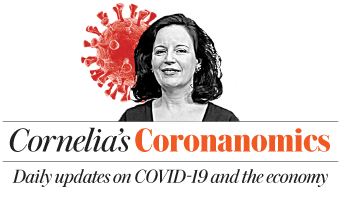What happened:
Markets rallied on three pieces of news and one shift in fundamentals. The S&P 500 was up by 3.2 percent, reaching its highest level since early March. The Hang Seng and the TOPIX were up 2.1 percent and 1.7 percent, respectively.

US Federal Reserve chair Jerome Powell reaffirmed that the Fed would use the full range of tools to deal with the recession and that interest rates would stay close to zero until the economy is back on track. French President Emmanuel Macron and German Chancellor Angela Merkel proposed a €500 billion package to be processed through the EU budget. Moderna reported positive results in early testing of its COVID-19 vaccine. The company hopes to enter phase three of clinical tests in July. Moderna shares soared. Health-care analysts warn that these are early days in terms of drug development.
Oil markets seem to be over the worst, because supply has contracted sharply due to massive cuts and demand growth exceeded expectations, as economies come out of lockdown. On May 10 the WTI June contract will expire. There is currently no danger of WTI turning negative, as it did wen the May contract expired on April 20.

US President Donald Trump threatened to make permanent the current temporary freeze of US contributions to the World Health Organization (WHO), unless the organization reformed within 30 days as well as canceling US membership.
UK employment numbers for first quarter showed job gains of 50,000. The unemployment rate was 3.9 percent, reflecting that UK only went into lockdown at the end of March. In April, 856,500 people filed for jobless claims, which indicates that many employers did not take advantage of the country’s work support scheme opting to fire staff rather than furlough them.
Background:
President Trump has voiced his discontent with the way China and the WHO handled the coronavirus outbreak many times. However, there might be more than the progression of the US-China rivalry and election soundbites behind US discontent with the WHO.
On Monday, China’s President Xi Jinping addressed the WHO general assembly and pledged $2 billion in aid to the pandemic health response. He stressed that any COVID-19 vaccines be made available to all and advocated for the preservation of international supply chains. The latter is in China’s national interest given the country’s pre-eminence in the pharmaceutical supply chains.
Making a vaccine available touches on intellectual property and pricing. The US, along with the UK, Switzerland and Japan, is concerned about the WHO’s so-called 2001 Doha Declaration whereby governments can overrule intellectual property rights in a public health emergency. The pharmaceutical and biotech industries contribute significantly to the gross domestic product (GDP) of the aforementioned countries and they would like to rely on voluntary measures instead of the Doha Declaration.
Macron and Merkel agreed to support a €500 billion coronavirus relief package. Funnelled through the EU budget, it will be distributed in the form of grants rather than loans, which is important when calculating the debt-to-GDP ratios in southern rim countries.
This is new money and the EU Commission could use its AAA rating to raise the funds on the international bond markets. The repayment obligation would be shared by all 27 EU member states.
It is significant that the EU’s two largest economies collaborated on the proposal and that fiscally prudent Germany stands behind it. Merkel emphasised the need for action, saying: “There is a risk that the EU’s cohesion will be endangered by the economic effects of this virus.”
The package will have to be discussed among the EU 27. Austrian Chancellor Sebastian Kurz has already voiced criticism and the Netherlands as well as other fiscally prudent northern countries may follow suit, fearing that the proposal was too close to the mutualization of debt and might lead to common fiscal frameworks. Do not expect passage of the package to be uncontested or easy.
Where we go from here:
The UK Department of International trade announced its post-Brexit tariff plan. Zero percent on imports would come in tariff free as opposed to a current 47 percent. A total of £30 billion of tariffs on supply chains would be removed. A 10 percent tariff on cars as well as protection for agricultural goods would remain. The government will remove items on goods promoting a green economy.

— Cornelia Meyer is a Ph.D.-level economist with 30 years of experience in investment banking and industry. She is chairperson and CEO of business consultancy Meyer Resources.
Twitter: @MeyerResources
















